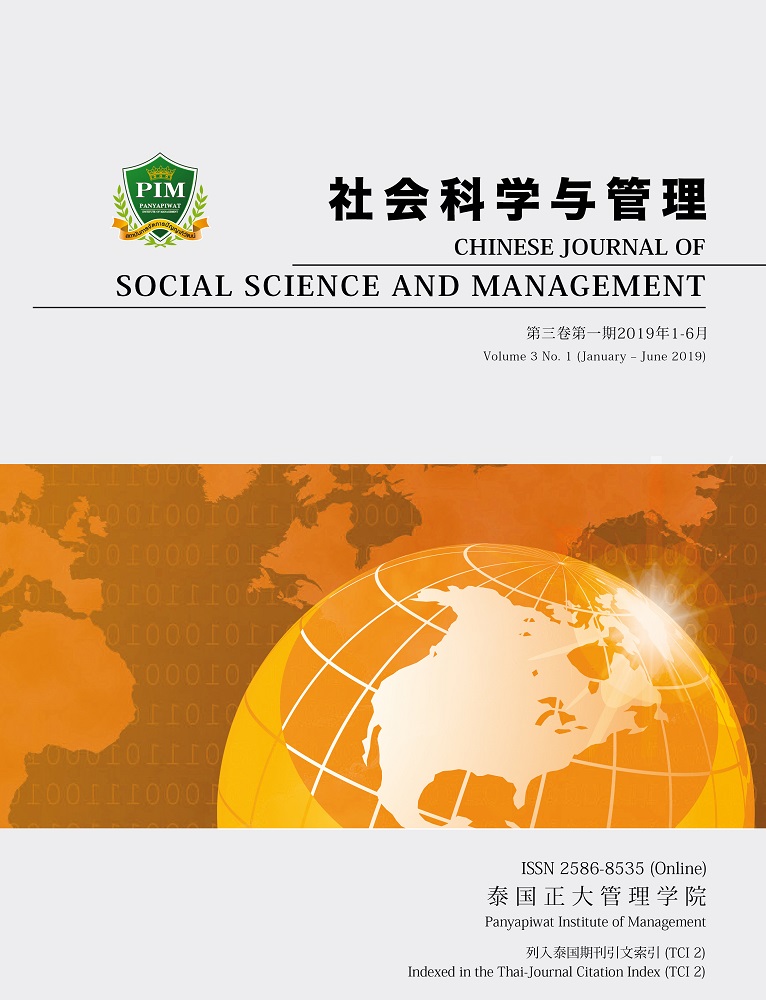A SURVEY ON CULTURAL IDENTITY OF ETHNIC GROUP OF YUNNANESE CHINESE MIDDLE SCHOOL STUDENTS IN CHIANGRAI’S SPECIAL ECONOMIC ZONE
Main Article Content
Abstract
The paper aims to study and analyze the current situation and developing trend of cultural identity of the ethnic group of Yunnanese Chinese middle school students in Chiangrai’s special economic zone, and performs a case study pertaining to the cultural identity of overseas Chinese. At the same time, it provides a reference for the government to formulate relevant national cultural policies and promote
the stable development of this ethnic group. We conducted a questionnaire survey which includes more than 200 students from four Yunnanese Chinese middle schools in the special economic zone. The results show that the respondents have formed a political identity with the host country, while they have not yet highly adapted themselves to the mainstream society in which Thailand’s diverse ethnic groups are integrated in terms of social relations situation, and they have relatively high level of identity with Chinese customs and culture. They are followers of Thai Buddhism in terms of religious beliefs and retain the religious beliefs of Buddhism and Taoism of the Chinese nation. They still have a high level of identity with the Chinese language, as they are quite willing to learn Chinese. This suggests that they still have a strong sense of identity with the Chinese culture and deem themselves as Chinese. In general, the students from Yunnanese Chinese middle schools in Chiangrai’s special economic zone have a relatively strong sense of identity with Chinese culture. At the same time, the ethnic cultural identity of the respondents have characteristics of duality and diversification, and will continue to coexist with the identity of the host country and culture, and is closely related to the development of Chinese education in the local area.
Article Details
Chinese Journal of Social Science and Management Editorial Division
The Office of Research and Development, Panyapiwat Institute of Management
85/1 Moo 2, Chaengwattana Rd., Bang Talat, Pakkred, Nonthaburi 11120, Thailand
Tel. 02 855 01048 E-mail: cjssm@pim.ac.th
References
Coughlin, J. R. (1960). Double Identity: the Chinese in Modern Thailand, Hong Kong: Hong Kong University Press.
Fei, Y. T. (2004). Anthropology and Cultural Self-awareness. Beijing: Huaxia Publishing House. [in Chinese]
Feng, X. F. (2014). A Survey Study on Language Use and Cultural Identity of Chinese Immigrants in New Zealand. English Square, (3), 126-129. [in Chinese]
Gardner, R. C. & Lambert, W. E. (1959). Motivational Variables in Second–language Acquisition. Canada. J. Psychol., (13), 266-272.
Hill, A. M. (1998). Merchants and Migrants: Ethnicity and Trade among Yunnanese Chinese in Southeast Asia. New Haven: Yale University Southeast Asia Studies.
Li, J. L. (2006). Ethnic Identity and Present Situation of Research. Nationalities Research in Qinghai, 17(1), 51-53. [in Chinese]
Ma, R. (2004). Sociology of Ethnic: Sociological Study of Ethnic Relations. Beijing: Peking University Press. [in Chinese]
Na, J. A. (2012). Cultural Identity of Overseas Chinese in Northern of Thailand. Journal of Inner Mongolia University for Nationalities (Social Sciences), 38(5), 75-79. [in Chinese]
Shen, L. (2015). Analysis of Language use and Cultural Identity of Overseas Chinese Families in Indonesia. World Ethno-National Studies, (5), 73-85. [in Chinese]
Sheng, Y. (1990). Principle of Language Teaching. Chongqing: Chongqing Press. [in Chinese]
Their Motive of Learning Chinese Language. Journal of Huaqiao University (Philosophy Social Sciences), (3), 67-71. [in Chinese]
Tong, C. K. & Chan, K. B. (2001). Alternate Identity: The Chinese of Contemporary Thailand. Singapore: Times Academic Press.
Wang, A. P. (2000). Cultural Identification of Southeast Asian Students of Chinese Descent and Their Motive of Learning Chinese Language. Journal of Huaqiao University (Philosophy Social Sciences), (3), 67-71. [in Chinese]
Wang, A. P. (2006). The Use of Chinese Language and Chinese Identity: A Survey of More than 400 Indonesian Chinese Students. Journal of Fuzhou University, (4), 86-90. [in Chinese]
Wangtakwadeen, N. & Lin, C. J. (2017). A Survey on Language Use and Language Attitudes of Yunnanese Chinese Middle School Students in Chiangrai’s Special Economic Zone. Panyapiwat Journal, 9 (Supplementary Issue), 177-193. [in Chinese]
Xu, G. Z. (1991). Xu Guozhang Talk Language. Beijing: Foreign Language Teaching and Research Press. [in Chinese]
Xu, Z. H. (2008). The Status Quo and Future for the Chinese Language Education in North Thailand. Journal of Huaqiao University (Philosophy Social Sciences), (3), 114-118. [in Chinese]
Yang, G. & Zhu, Z. (2013). A Survey and Analysis of Chinese Cultural Identity of Overseas Chinese Youth Students. Journal of Fujian Institute of Socialism, (2), 54-56. [in Chinese]
Zhang, S. F. & Lu, F, B. (2009). The Study of Filipino-Chinese Secondary School Students’ Cultural Identity of Ethnic Group. Journal of Fujian Normal University, (6), 134-143. [in Chinese]
Zhao, J. S. & Xu, P. (2014). A Survey Study on National Cultural Identity of Guangxi Zhuang Autonomous Region. Journal of South-Central University for Nationalities (Humanities and Social Science), 34(2), 55-59. [in Chinese]
Zou, X. Y. (2012). A Research on the Factors of Filipino–Chinese School Students Language Attitude and Culture Recognition. Master’s thesis, Fujian Normal University. [in Chinese]


